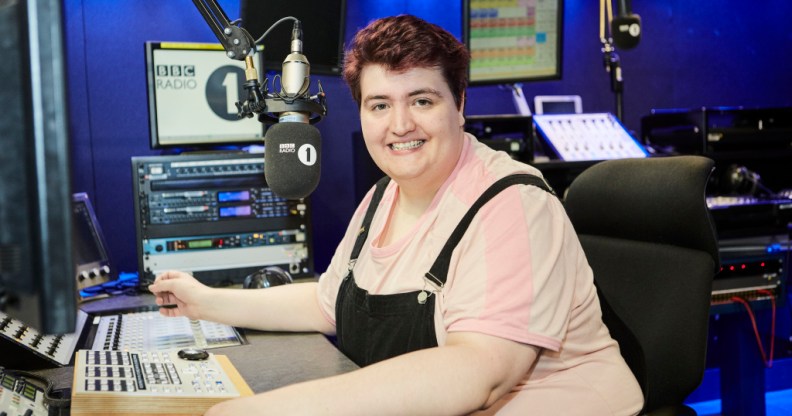BBC Radio 1’s first-ever non-binary presenter slams ‘institutional transphobia’ in damning open letter

Jacob Edward made history as the first openly non-binary person to host a show on BBC Radio 1 in 2019.
The first openly non-binary presenter on BBC Radio 1 is calling on the radio industry to address “institutional transphobia” and do more to represent transgender voices.
Jacob Edward, who made history in December 2019 when they were the first non-binary person to host a BBC Radio 1 show, also shared their own experiences of facing transphobia in the industry they work in.
In an open letter, the Gaydio host and producer said that after their BBC appearance, they were inundated with messages from trans and non-binary people that “helped me to understand just how rare a voice like mine was on air”.
While acknowledging that the radio industry is “notoriously difficult to break into”, Edward said: “The fact that there has only been one out transgender radio presenter with a regular show on mainstream radio in the UK, alongside the fact I can count the number of trans and non-binary producers I know on one hand, suggests a further barrier: subtle and deep rooted transphobia.”
Edward told PinkNews that they decided to call out transphobia in the radio industry immediately after their historic BBC Radio 1 appearance.
They said: “The amount of people that reached out to me despite only briefly mentioning my gender on air, due to my own anxieties, made me want to work with this new mini platform to try to improve things.
“It took a lot longer to get right than I thought, but I genuinely hope people working in the industry take note.”
Their open letter, signed by other trans and non-binary radio industry professionals, calls on music radio stations to include presenters pronouns on air as well as their names, and to add artist’s pronouns to the track list.
“Change is never easy, but adding ‘I use she/her pronouns’ after you say your name on air makes you an amazing ally to the LGBT+ community by helping to normalise introducing your pronouns. In time then, it won’t just be seen as ‘just a trans thing’,” they said.
Edward continued: “In talk radio and talk programming, gender identity and the human rights of transgender people should never be seen as a casual debate topic.
“When you invite people who hold transphobic views onto your shows you are platforming hate speech. This does nothing but legitimise transphobia, the result of which is almost always seen as an increase in hate crime against transgender and non-binary people.”
The open letter comes after senior MPs and LGBT+ activists branded the BBC “institutionally transphobic” in June.
In July, the row about trans issues at the BBC intensified as the public-service broadcaster quietly dropped LGBT+ charities from its trans-support pages.
First non-binary BBC presenter demands change from radio industry in face of ‘transphobia’.
As well as normalising the use of pronouns on-air and in track lists, Edward has three demands for the radio industry to break down barriers for trans and non-binary people who want to work in it.
These include asking regulator Ofcom to engage with the trans and non-binary community ahead of its next diversity in radio report, after the 2019 version failed to mention non-binary people at all.
And Edward wants to see trans and non-binary people involved in making or consulted on programmes that discuss trans-related topics. They also want to see station managers, programmes managers, hiring managers and industry leaders commit to “creating an LGBT+ training and hiring pledge” with a view to creating more roles for trans and non-binary people.
“Radio is a gateway into people’s everyday lives,” Edward said. “It is a medium that has the power to further equality and diversity.
“Self-doubt and imposter syndrome are real, valid obstacles for anyone wanting to enter the radio industry from a marginalised background. It’s a hard industry to get started in for anyone, but these compounding factors don’t need to exist. Representation holds the key to that change.
“The world needs more trans and non-binary people both on air and off air in radio. This is especially important at a time like this when the media is full of transphobia and hate crime against trans people has increased drastically.
“Essentially: without us you are missing out on unique and authentic voices that people need to hear. The radio industry may be primarily made up of cisgender people, but you have the power to help.”
Radio industry professionals can add their names to the open letter here.

